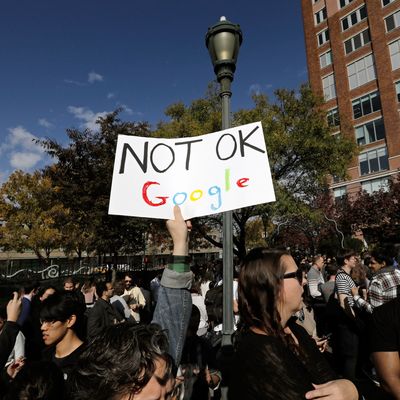
On Tuesday, a group of Google employees published a statement on Medium, asking the search giant to stop its work on Dragonfly, Google’s tentatively planned effort to introduce a search engine for China in compliance with the Chinese government’s stringent censorship and surveillance demands. “Many of us accepted employment at Google with the company’s values in mind, including its previous position on Chinese censorship and surveillance, and an understanding that Google was a company willing to place its values above its profits,” they wrote. “After a year of disappointments including Project Maven, Dragonfly, and Google’s support for abusers, we no longer believe this is the case. This is why we’re taking a stand.” When it was first published, the letter was signed by 12 employees using their real names; within an hour, another 12 had added theirs. By the following morning, nearly 400 Google employees had added their names and titles to the document.
In some industries, an open and public show of dissent like this might not be remarkable. Unions frequently object to management decisions with statements and press conferences, and if you haven’t spent much time covering or reading about Silicon Valley, this might not seem all that different from, say, the way Guardian journalists publicly objected to their paper’s editorial stance on trans rights. But it’s pretty remarkable in the contemporary tech industry, which has managed to maintain a kind of omertà among its employees — a vow of silence that has made it uniquely difficult to get a clear picture of the inner workings of many of the world’s biggest and wealthiest companies.
For years, reporting on tech companies has been, at best, extremely difficult. Not impossible by any means — see the many stories broken by publications like The Information or Businessweek — but a pain in the ass. It’s not just that the press operations of the big tech companies are comparatively more withholding than those of their non-tech peers. It’s that the employees are, too. The overwhelmingly young and mission-driven Silicon Valley workforce has by and large regarded reporters as, at best, nosy dopes, and, at worst, malevolent liars. Some of them seem to genuinely believe in their companies as forces for good that journalists are intent on undermining. Others might just be scared of the “rat-catching” teams employed by Facebook and other companies to “squash you like a bug” for leaking information. (There’s also the fact that many tech workers are partly compensated in stock, and would rather not leak information that might hurt their options.) Thanks to the silence of the true believers and the paranoiacs, it has been difficult to know exactly what’s been going on inside companies like Facebook and Google as they’ve confronted accusations of misinformation, harassment, and bias over the last few years.
But the omertà seems to be breaking. It’s not just that we’re increasingly seeing current and former employees at all levels open up to reporters — the Times’ monster Facebook story from mid-November seems like ample proof of that. It’s also that the employees themselves are opening up to the public. Just a few hours after the dissenting Google employees published their statement, former Facebook executive Mark Luckie posted to Facebook a lengthy letter describing how Facebook is “failing its black employees and its black users.” Luckie isn’t the first tech employee to publicly discuss his negative experiences with an employer — Susan Joy Fowler famously upended Uber with a wrenching description of her time at the ride-share company — but he’s the first executive at Facebook (which is second only to Apple as the most notoriously secretive company in the Valley) to do so. (Even the engineer who thought Facebook didn’t have enough political diversity initially limited the circulation of his memo to the company’s internal discussion boards.)
Why the change? Tech workers are reading the same coverage of their companies that users are — and generally know more even than what’s being reported. It’s much harder to keep quiet for the sake of your company’s mission if you don’t think it’s staying true to that mission, as the Google employees who signed the open letter made clear.
And no one, it seems, is afraid of the ratcatchers anymore. The Dragonfly dissenters’ strategy is reminiscent of the Google Walkout protests, held by employees who were righteously angry over a Times report about the company’s handling of sexual-harassment and discrimination claims. In classic labor-organizing fashion, the Walkout organizers were open about their identities, campaigned publicly for their demands, and were more than happy to discuss their complaints with reporters; by making themselves so public — and by inspiring 20,000 of their coworkers to join them — they made themselves effectively unpunishable.
Of course, it remains to be seen what will happen to the signers of the anti-Dragonfly letter, or to the Facebook employees who were the sources for the Times’ extensive reporting on the company’s faults. No company likes to have its dirty laundry aired in public. But as tech platforms like Google and Facebook take on increasingly large responsibilities, it’s also increasingly important that the public should have some idea of what’s going on inside them — and that employees feel empowered to hold companies to the lofty ideals they claim.





























